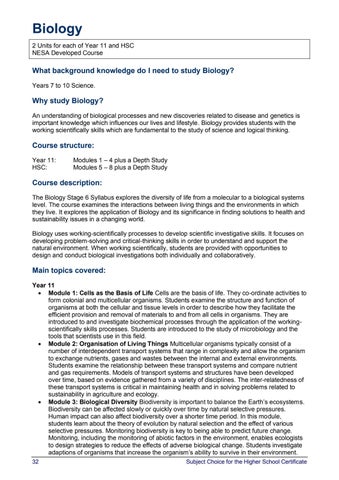Biology 2 Units for each of Year 11 and HSC NESA Developed Course
What background knowledge do I need to study Biology? Years 7 to 10 Science.
Why study Biology? An understanding of biological processes and new discoveries related to disease and genetics is important knowledge which influences our lives and lifestyle. Biology provides students with the working scientifically skills which are fundamental to the study of science and logical thinking.
Course structure: Year 11: HSC:
Modules 1 – 4 plus a Depth Study Modules 5 – 8 plus a Depth Study
Course description: The Biology Stage 6 Syllabus explores the diversity of life from a molecular to a biological systems level. The course examines the interactions between living things and the environments in which they live. It explores the application of Biology and its significance in finding solutions to health and sustainability issues in a changing world. Biology uses working-scientifically processes to develop scientific investigative skills. It focuses on developing problem-solving and critical-thinking skills in order to understand and support the natural environment. When working scientifically, students are provided with opportunities to design and conduct biological investigations both individually and collaboratively.
Main topics covered: Year 11 • Module 1: Cells as the Basis of Life Cells are the basis of life. They co-ordinate activities to form colonial and multicellular organisms. Students examine the structure and function of organisms at both the cellular and tissue levels in order to describe how they facilitate the efficient provision and removal of materials to and from all cells in organisms. They are introduced to and investigate biochemical processes through the application of the workingscientifically skills processes. Students are introduced to the study of microbiology and the tools that scientists use in this field. • Module 2: Organisation of Living Things Multicellular organisms typically consist of a number of interdependent transport systems that range in complexity and allow the organism to exchange nutrients, gases and wastes between the internal and external environments. Students examine the relationship between these transport systems and compare nutrient and gas requirements. Models of transport systems and structures have been developed over time, based on evidence gathered from a variety of disciplines. The inter-relatedness of these transport systems is critical in maintaining health and in solving problems related to sustainability in agriculture and ecology. • Module 3: Biological Diversity Biodiversity is important to balance the Earth’s ecosystems. Biodiversity can be affected slowly or quickly over time by natural selective pressures. Human impact can also affect biodiversity over a shorter time period. In this module, students learn about the theory of evolution by natural selection and the effect of various selective pressures. Monitoring biodiversity is key to being able to predict future change. Monitoring, including the monitoring of abiotic factors in the environment, enables ecologists to design strategies to reduce the effects of adverse biological change. Students investigate adaptions of organisms that increase the organism’s ability to survive in their environment. 32
Subject Choice for the Higher School Certificate





